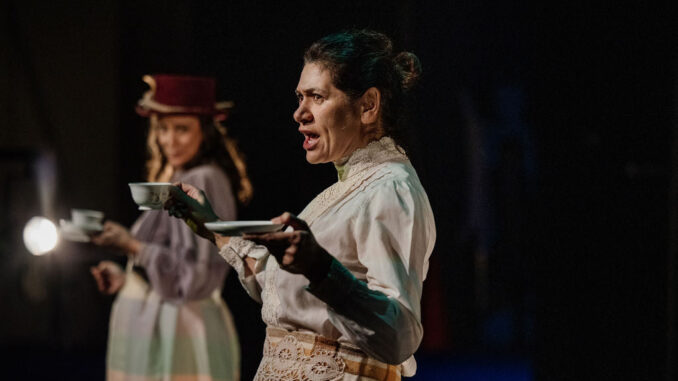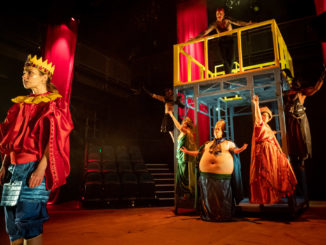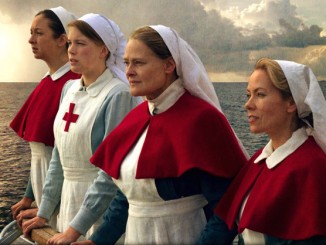
[Existing In Between]
“Kūpapa (noun) collaborator, ally, — a term that came to be applied to Māori who sided with Pākehā opposition or the Government. There has been a shift from a general meaning of neutrality to the modern use, which now sometimes has derogative connotations; traitor.” – maoridictionary.co.nz
This play, however, is no straightforward indictment of protagonist and historical figure Lucy “Takiora” Lord. Rather, it almost harks back to kūpapa’s earlier primary meaning of ‘neutrality’. Nicola Kāwana’s beautiful and efficiently told play depicts Takiora (Renaye Tamati) as a woman caught between two worlds. Not only was she of mixed race, but she also worked as a guide and interpreter for British commanders during the Taranaki Wars of the 1860s. It was her actions while working for the British that had her branded a traitor by many of her people.
Kūpapa transports us to late 1860s Aotearoa – politics, war, the encroaching takeover of the British, the struggle within Māoridom on how best to deal with the colonisers, and the wāhine who were trying to use what little power they had.
Director Erina Daniels uses simple but effective staging and set design to bring the dynamism of the text to life, projecting Marcus Winter’s beautiful sand art, including the filming of it being made in (almost) real time. This reminds us of the soil which is being fought over – a nation and land which is being shaped by human actions at this very moment.
Ccostumes evoke the mix of the traditionally Māori with the Victorian, symbolising the two forces vying for power and respect, as well as the liminal identities held by Takiora and her two sisters, and probably many other Māori at the time.
Paige Pomana’s sound design stokes the rhythm and helps us transition from courtly Victorian houses to battle camps, to lecherous and pompous old men, to the wilderness. Sadly, however, the mix was a little loud, sometimes obscuring the dialogue and making it difficult to keep up with this text-heavy work. Though unfortunate, this is really the only complaint I have about the experience, and it will surely be fixed as the season continues.
The cast are cohesive and incredibly strong. Tamati absolutely nails the performance, depicting Takiora’s power, vulnerability, passion, guilt and devastation with remarkable ease. Lana Garland and Kāwana herself likewise inhabit their many roles with depth, energy and sincerity.
The text is expertly written. Kāwana deftly weaves in Te Reo, again realistically evoking the two worlds these women were inhabiting, and she has chosen specific moments in Takiora’s story, succinctly crafting a piece that is thought-provoking, urgent, dramatic, funny and extremely moving. She does not shy away from the atrocities that Takiora is (somewhat indirectly) responsible for, but she provides no clear answers or moral didacticism either. Kāwana seems to say that there can be no simple judgement of Takiora, and leaves it up to us to simply empathise with her.
In this way, Kāwana is successful in placing a female lens on a tale “that has been told by men for generations”. With depth and compassion, Takiora’s complexity is explored – she explains she is working with the British, helping them even to purchase Māori land, in order to secure a future for both peoples. Translation is, itself, an act of working to understand two perspectives, of bridging a gap in comprehension. We may never truly know why Lucy Lord chose the path she did, but the nuance that exists in her story reminds us that history is not all big concepts of black and white morality, but is built of the humanity of individuals.
I would recommend doing a little familiarising with the figure of Lucy Lord before seeing this play, as I think that is the way to fully appreciate the story within its context. (There is no spoon-feeding the audience here.) But even if you know nothing of her beforehand, as I did, you still will be immersed in the world, in the feeling, tone and high stakes of the time, and drawn in by the elusive figure of Takiora.
Time plays a large role in this piece, perhaps best encapsulated by one of my favourite scenes – where Takiora explains the white man’s timepiece (and the Pākehā way of measuring time) to an older Māori woman. This scene reminds us of the deep, fundamental impact of colonisation – that everything down to the concept of time was taken and changed to the European model. It reminds me, personally, that this conception of time does not seem to be serving us too well in our hectic, modern world. But it also shows us Takiora’s simple delight at the timepiece, her connection to a concept that she feels will bring order to what must have felt a messy and confusing time in which to grow up. It reminds us that it is not only land being fought over, but the very perception of reality, which is not as predetermined as we might like to think. Just as Matariki is not a fixed moment but instead relies on the natural progression of the stars, we are reminded that time is but a concept that we have the power to change. We do not need to charge forward in a linear manner, but instead we can take the time to reflect on the past, on how our past and present are intertwined, on the cyclical nature of history. As producer Amber Cureen said as she addressed the opening night audience, this is a play about looking back to the past to inform the future.
As a Pākehā, this story serves to remind me that colonisation was not a one-and-done. It is an on-going process that continues to this very day, and I’m sure the struggle of Takiora to rectify the two sides of herself is one that will be familiar to many in Aotearoa. Many of us, myself included, know very little about the New Zealand Wars and the individuals who lived through the period, and that is such a shame. But this play was thrilling, entertaining and powerful, and I want to drink it all up. These are the stories that we should be telling – those that bring the history of this land to life, and those that remind us why knowing our history is vital to moving forward.
Kūpapa plays Te Pou theatre 3 to 10 July, 2021.




Leave a Reply